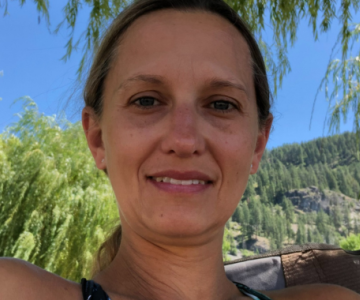Breadcrumb
Explore Stories
5 Minute Read
Health & Wellness
Cathy* has no memory of crashing her motorcycle, an event that nearly claimed her life in 2010.
She had been riding home to Penticton from Kelowna on Highway 97 after a day at the beach. “All I remember from that day was the blinding sun,” she recalls. “And I have a vague recollection of feeling gravel under my tires.”
When she woke up, she was strapped down in a hospital bed at Penticton Regional Hospital. She had broken three vertebrae in her neck, and shattered her collarbone.
Cathy was in a neck brace for four months. She went to physio and massage therapy for seven months for her atrophied muscles, and she lost 25 pounds from not being able to eat properly. Dr. Justin Naude, an orthopedic surgeon, rebuilt her collarbone with six screws.
“I had a pinched nerve for 34 years before my accident, and that disappeared,” she jokes. “But try explaining to your three-year-old son that he can’t hug Mommy.”
4 Minute Read
Health & Wellness
Every day in British Columbia, tens of thousands of people take care of loved ones with medical, physical, emotional and age-related needs – spouses, parents, grandparents, siblings, children, friends and neighbours. Care can look like picking up some groceries, or cooking a meal. It can be bringing a loved one to health-care appointments. Or it can be round-the-clock care.
If you find yourself in such a role, you are, in fact, a caregiver. In B.C., it’s estimated over 26 per cent of our population – or more than one million people – offer free care, equivalent to an economic value of $14.7 billion. Together, caregivers provide about 80 per cent of the at-home care for family and loved ones.
Unpaid caregiving is not only a pillar of our health-care system, it’s embedded in the fabric of our social and family structures. That’s not to say it’s an easy, ideal or appropriate role: anyone who has taken on the responsibility of care can speak to the burnout, stress, fatigue and frustration the role entails. Providing care and navigating the health-care system can be complex, confusing and exhausting.
3 Minute Read
Community & Culture
Early in his life, Craig knew he wanted to help people in any capacity he could. Born in North Vancouver and raised in Kelowna, Craig enjoyed a varied career in the Canadian Armed Forces and as a police officer in the RCMP, and pursued his passion for animals by working with horses before joining Interior Health (IH) in 2017.
After moving away from Kelowna for some time, Craig and his family returned in 2012. “I am honoured to have the opportunity to raise a family on these beautiful lands, and acknowledge that this privilege comes as a result of significant trauma to the Indigenous nations of this country. I’m committed to reconciliation and learning to live in harmony with the people, animals and plants of this beautiful land.”
3 Minute Read
Health & Wellness
Our daily routines – mealtimes, family chore time and bedtime – offer opportunities for caregivers and parents to connect with toddlers and preschoolers. But did you know they are also an opportunity to develop children’s speech and language skills?
“As pediatric speech-language pathologists, we know how important social interactions are in the development of speech, language and communication skills in infants, toddlers and preschoolers,” says Christina El Gazzar, professional practice leader, early childhood development speech and language services, Interior Health.
Life with infants, toddlers and preschoolers can be challenging, especially when it comes to mealtime, family chore time, bedtime and the in-between transitions throughout a day.
May is Speech and Hearing Month, and we’re sharing weekly tips on how to navigate the most common routines that families with young children regularly experience. We share tried-and-true strategies along with age-appropriate vocabulary to not only make routines painless, but to also support young children’s language growth, providing them with a strong foundation for school success.
4 Minute Read
Community & Culture
Name: Teresa Packer (she/her/hers)Job Title: Support services supervisorYears of Service: 15Worksite: Kootenay Boundary Regional Hospital (KBH)Community: TrailAncestral Territory: Ktunaxa (tun-ah-ha)/ Kootenay KtunaxaFavourite Quote / Advice to live by: Stay positive, make someone laugh and give a compliment every day. This will make for a healthier and happier you.
When Teresa Packer walked into Kootenay Boundary Regional Hospital 15 years ago to apply for a food service worker role, she was a first-time mother looking to rejoin the workforce. Bringing her 18-month-old son along at the time, they spoke with the support services supervisor for more information. Little did Teresa know that this would be her role a few years down the line.
Teresa is now the housekeeping and food service supervisor based in Trail, and if she isn’t helping out someone at work, she’s likely taking care of family or a filly nearby!
4 Minute Read
Health & Wellness
In 2021, a year marked by catastrophic wildfires and floods in B.C., Tamara Sommer was hired to support the Health Emergency Management B.C. (HEMBC) team at Interior Health (IH). Today, Tamara is the Indigenous HEM liaison, supporting First Nations communities throughout the Interior region.
Tamara was recently interviewed for Interior Voices, IH’s Aboriginal health and wellness podcast series that explores the intersection of health and culture in the workplace, everyday lives and patient care. In it, she talks about her role, the barriers and challenges of emergency management (EM) and what she hopes for the future of EM in B.C.
3 Minute Read
Health & Wellness
It’s that time of year when the weather has warmed up and the snowpack is rapidly melting, causing some localized flooding in communities across Interior Health.
Flooding causes devastation to infrastructure, municipal and personal property, but it can also have major health implications, such as contaminated water. Residents impacted by flooding need to be aware of the potential risks associated with drinking water at this time.
“Roaring streams and high water in the spring are normal for folks in the B.C. interior, but our changing climate is resulting in increased frequency and severity of flooding in our region,” says Interior Health’s Manager of Drinking Water Systems Program Ivor Norlin. “Knowing where your water comes from and who provides it to your home is important for ensuring you’re quickly informed of possible drinking water health hazards.”
7 Minute Read
Community & Culture
National Nursing Week is an annual celebration that occurs the same week as Florence Nightingale’s birthday, May 12.
The theme for 2023 is Our Nurses. Our Future. This theme showcases the many roles that nurses play in a patient’s health-care journey. The past few years have brought to light the courage and commitment that nurses work under every day, and showed the important role that nurses play in the community.
“To all our Interior Health nurses, I would like to take the opportunity to thank you for your ongoing commitment to supporting patients, clients and each other in our journey to optimal health and well-being for all. Your caring continues to touch everyone here at IH, and beyond.”
- Cheryl Whittleton, Chief Nursing Officer & Professional Practice Lead
6 Minute Read
Health & Wellness
If you're having a baby in Penticton, you’re part of an international initiative to improve the care that families receive before, during and after the birth of their baby, thanks to the Baby-Friendly Initiative.
The Baby-Friendly Initiative, or BFI, is a World Health Organization and UNICEF program that guides health-care providers in breastfeeding best practices, and ensures families have the support they need and want.
In 2019, Penticton Regional Hospital (PRH) and Penticton Health Centre (PHC) collectively were one of only 25 sites in Canada to be chosen to pilot a BFI project. Now, three years later, PRH and PHC are on the cusp of receiving their baby-friendly designation thanks to the work of project co-leads Meggie Ross, Patricia Park and Cindy Barton.
For expectant families in and around Penticton, the designation means knowing they’re receiving optimal care that gives mothers, babies and families the best start in life.
As Meggie Ross explains, “The goal of BFI is to make breast and chest feeding easier for families by helping them get off to the best start possible, and supporting them for as long as they need. With BFI’s 10 steps to successful breastfeeding policies in place at our facilities, we know the family’s experience improves, and breastfeeding rates increase.”
If you or your family is having a baby in Penticton, this is what BFI means for you.
-
Load More
Showing 225 of 677
STAY CONNECTED
Receive news and alert posts, and Stories@IH blog posts, right to your inbox!









